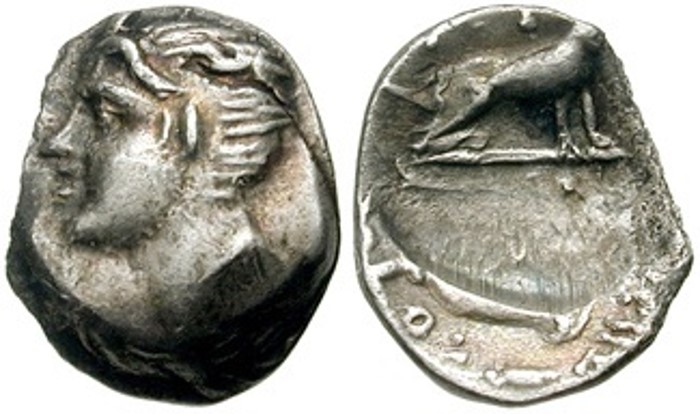2058 - Cydonia (AR Pan/hound) over Rhodes (Helios/rose) (CNG, EA 64, May 2003, 130)
From SILVER
200 BCE - 180 BCE | ΚΥ
Location/history
| Sale(s)Sale(s) ᵖ: | Classical Numismatic Group, EA 64, 7 May 2003, 130 | |
| Private collection(s)Private collection(s) ᵖ: | Ch. E. Weber Collection |
Overstriking coin
Description
| ObverseInscription or printing placed on the obverse.: | Head of Pan left. | ReverseInscription or printing placed on the reverse.: | ΚΥ (Greek) Hound seating right. |
Mint and issuing power
| MintIdentifies the place of manufacture or issue of a numismatic object.: | Cydonia | Ancient regionAncient region. | Crete | Modern countryModern country: Greece | AuthorityIdentifies the issuing power. The authority can be "pretended" when the name or the portrait of X is on the coin but he/she was not the issuing power. It can also be "uncertain" when there is no mention of X on the coin but he/she was the issuing power according to the historical sources: |
Chronology
| FromIdentifies the initial date in a range assigned in a numismatic context. 200 BCE toIdentifies the final date in a range assigned in a numismatic context.. 180 BCE | Hellenistic 323-30 BC |
Physical description
| MetalThe physical material (usually metal) from which an object is made.: Silver |
WeightWeight of the numismatic object (in grams). in grams: 1.251.25 g <br />1,250 mg <br /> | DenominationTerm indicating the value of a numismatic object. Examples: tetradrachm, chalkous, denarius.: trihemiobol |
|
| DiameterDescribes diameter of an object (in mm).: 1111 mm <br />1.1 cm <br /> | StandardStandard.: Aeginetic | ||
References
| Coin referenceReference of the Coin: | Coin series referenceReference to coin series study: | Svoronos 18901Svoronos 1890, n° 18, Le Rider 19662Le Rider 1966 | |
| Coin series web referenceCoin series web references: | |||
Overstruck type
Description
| ObverseInscription or printing placed on the obverse.: | Radiate head of Helios facing slightly right | ReverseInscription or printing placed on the reverse.: | Name of moneyer (Greek) Rose with bud to right |
Mint and issuing power
| MintIdentifies the place of manufacture or issue of a numismatic object. ᵖ: | Rhodes | Ancient regionAncient region. ᵖ | Caria (Rhodes) | Modern countryModern country: Greece | AuthorityIdentifies the authority in whose name (explicitly or implicitly) a numismatic object was issued. ᵖ: | Rhodian power |
Chronology
| FromIdentifies the initial date in a range assigned in a numismatic context. 275 BCE toIdentifies the final date in a range assigned in a numismatic context.. 250 BCE | Hellenistic 323-30 BC |
Physical description
| DenominationTerm indicating the value of a numismatic object. Examples: tetradrachm, chalkous, denarius. ᵖ: | hemidrachm |
References
| Coin type referenceReference to coin series study ᵖ: | Ashton 2002c3Ashton 2002c, n° 197-8, HGC 64HGC 6, n° 1447 | ||
| Coin series web reference overstruckCoin series web references overstruck: | |||
Additional data
| Frequency of overstrikesFrequency of overstrikes: | frequent | Level of confidenceLevel of confidence of the identification: | sure |
| RemarksRemarks: | "overstruck on a Rhodian Hemidrachm of circa 275-250 BC" | ||
References
- ^ Svoronos, Ioannes N. (1890), Numismatique de Crète ancienne, accompagnée de l'histoire, la géographie et la mythologie de l'île. Première partie, description des monnaies, 2 vol., Macon, Impr. Protat frères.
- ^ Le Rider, Georges (1966), Monnaies crétoises du Ve au Ier siècle av. J.-C., Paris, Geuthner, 345 p. and 42 pl.
- ^ Ashton, Richard (2002), "Catalogue of the early silver coinage of Rhodes," in Richard Ashton, Philip Kinns, Koray Konuk and Andrew Meadows, "The Hecatomnus Hoard (CH 5. 178, 8. 96, 9. 387)", Coin Hoards, IX, London, p. 140-158
- ^ Hoover, Oliver D. (2010), The Handbook of Greek Coinage Series, volume 6 : handbook of coins of the islands: Adriatic, Iionian, Thracian, Aegean, and Carpathian seas (excluding Crete and Cyprus), sixth to first centuries BC, Lancaster, 358 p.

